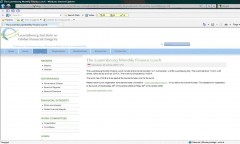10/28/2009
Luxembourg Is Going to Fool the International Institutions
When the Luxembourg Institute for global Financial Integrity was launched in May, Richard Murphy was contacted by Gibb McNeil, its Executive Director (also board member and president of the executive committee).
Richard noted the extraordinary fees they propose charging which are way beyond most NGOs, let alone academics or others who might have interest.
LIGFI has officially announced (with a delay) the Luxembourg Monthly Finance Lunch that is held at the Cercle Munster, 5-7, rue Munster, L-2160 Luxembourg City. The event starts at 11:45 h with drinks, followed by lunch at 12:15 h. The event is concluded by 14:00 h.
The lunch fee of 50 € is to be paid at the Cercle Munster prior to the lunch.
The lunch fee is telling of what Richard observed 6 months ago and raises a couple of questions:
The lunch fee for LIGFI is 50 € whereas the lunch fee for AMCHAM for example is 40 €
Why is it so expansive ? Such fee is way beyond most NGOs, let alone academics or others who might have interest.
Will NGOs and academics be invited by banks and other financial institutions ? If yes, what about their independance?
The pre-announcement for the “Luxembourg Monthly Finance Lunch” was online on Wednesday, 21 October 2009.
The day after a new ALFI brochure: " Your bridge between Europe and China: Luxembourg" by ALFI whose members would be wealthy enough to invite NGOs and academics.
This brochures states page 2 : Shape regulation. An up-to-date, innovative legal and fiscal environment is critical to defend and improve Luxembourg’s competitive position as a centre for the domiciliation, administration and distribution of investment funds. Strong relationships with regulatory authorities, the government and the legislative body enable ALFI to make an effective contribution to decision-making through relevant input for changes to the regulatory framework, implementation of European directives and regulation of new products or services.
This sounds like a renewal of what Rafik Fischer said a couple of years ago that I have quoted several times.
What is the practical consequence?
Professionals confirm they decide of the regulatory framework : hence for example poor sanctions compared to what is done in other jurisdictions ; this is the reason why the crime pays in Luxembourg.
Professionals confirm they decide of the implementation of European directives : hence for example the changes to the UCITS directive that introduced the flexibility (the so-called
innovative legal and fiscal environment) that facilitated the drift with Madoff.
Professionals confirm they decide of regulation of new products or services.
In this context, regulation is a frontage in the jurisdiction. So is the recent talk on ethics through LIGFI.
QED.
Will FATF and OECD smell the coffee?
18:01 Posted in Luxembourg | Permalink | Comments (0)
The quotation of the day
"Si, aujourd’hui, l’évasion fiscale est égale à la fraude fiscale, et donc un crime, chaque Suisse en est complice pour avoir profité de la prospérité que nous a amenée tout cet argent étranger pendant des années!"
(Free translation: If today tax evasion is equal to tax fraud, and is therefore a crime, everyone in Switzerland is accomplice for having accepted the prosperity which brought us all this foreign money for years!”)
Source: Le Temps
05:40 Posted in General | Permalink | Comments (0)
Foreign Banks Face U.S. Tax for Concealing Accounts
Bloomberg has reported that two leading U.S. lawmakers proposed legislation that would impose new taxes on foreign banks that refuse to disclose the identity and contents of accounts owned by Americans.
The measure would impose a 30 percent withholding tax on income from U.S. assets held by non-U.S. institutions that refuse to name American account holders and report balances, deposits and withdrawals.
However the bill disappointed some of the most-aggressive critics of offshore-tax avoidance. It doesn't include a proposal from Mr. Obama to establish legal presumptions that favor the IRS in prosecuting suspected tax dodgers. It also leaves out more-stringent proposals from other lawmakers, including one that would treat offshore corporations as U.S. firms for tax purposes if their senior executives were located in the U.S. (see WSJ)
05:25 Posted in General | Permalink | Comments (0)







